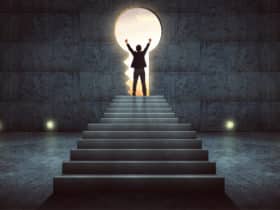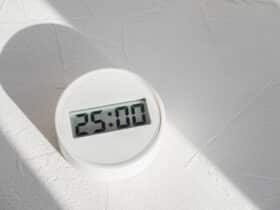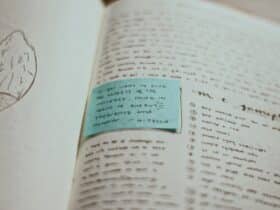So, you decided to work remotely. After all, you’ve heard that working from home has a number of advantages:
- You sleep as long as you like,
- You don’t have to commute an hour (or two) to work,
- Your stress level declines, and…
- You’re more productive.
Sounds wonderful, indeed. Is it true, though?
Maybe those are only myths about working from home?
When I started working as a freelance writer, I noticed that I was happier. I would sleep until 10 A.M. every day, eat breakfast while checking my email and then, work in bed until late afternoon. Those were wonderful days. I didn’t have to hurry anywhere, listen to the awful sound of my alarm going off or attend useless meetings. That time was great.
Yes, you understood it right. That time was great. It no longer is, because after a month of working like that, my productivity, mood and happiness declined. What is the reason?
I started waking up exhausted every single day.
There is nothing worse than going to bed tired and waking up in an even worse condition in the morning. It spoils your whole day.
Is there anything you can do about it? Yes, there is.
Today I’d like to share with you 7 reasons why you are waking up tired in the morning and give you tips on how to fix it.
Let’s begin!
Blanket, pillow and my laptop. Perfect!
There’s nothing more tempting than placing your laptop on your knees or next to your pillow and work in bed all day long. It’s comfortable, warm and you don’t have to jump out of your pajamas. Sounds great, but you will suffer consequences soon enough.
When you work in bed, you destroy your sleep-cycle. Unawares, you teach your body that a bed isn’t a place to calm down and relax, but a place to get things done. So, when you sleep, your body and your mind won’t rest.
The first step to fixing it is to remember the 2S rule: bed is for sleep and sex, only. The second step is to create a home office. That’s right! Find a place at home which your body will associate with work, only. A desk, a chair and a lamp is enough for the start.
An hour more, please.
Most people think that the more sleep, the better, when, in fact, the more sleep, the more tired, unhappy and unproductive you’ll be when you wake up.
According to research, oversleeping causes such mental conditions as decreased cognitive function, depression, back pain as well as headaches.
In order to prevent it, remember that the normal and healthy amount of sleep for adults is between 7 to 9 hours. So, in order to feel less tired, sleep 8 hours. Don’t snooze and don’t take additional naps. They won’t make you feel any better.
It’s still night…
When it’s dark, our bodies produce melatonin, a hormone that regulates an individual’s body clock. It’s triggered in the evening, continues to be released during the night and drops as soon as the body is exposed to daylight.
If you wake up exhausted during the warm seasons, when days are long, remember to open your curtains and let the light in as soon as you open your eyes. You can also sleep with opened curtains provided that your bedroom is still dark when you go to bed.
During the cold seasons, when days are short, turn the light on as soon as your alarm goes off. It’ll help your body wake up. Also, don’t reason with yourself: half an hour more will not result in sun shining outside. Teach yourself to take a morning walk or a warm bath instead.
One glass of wine will do it.
Surely, you’ve tried it at least once. When you can’t fall asleep, you go to the kitchen, grab a bottle of wine, pour yourself a glass, drink it and go back to bed. Within a couple of minutes, you drop off. But, what happens in the morning? That’s right! You’re tired and your head’s heavy.
Study shows that although alcohol helps you to fall asleep faster, it doesn’t improve the quality of sleep. Alcohol disrupts the REM phase of sleep. During that phase, you dream, your body relaxes and repairs itself. If you disrupt that cycle, you cause drowsiness, lack of concentration and exhaustion.
Solution? If you can’t fall asleep in the evening, don’t drink any alcohol. Instead, read a book, walk around for a while, do some yoga or listen to relaxing music. When you feel tired, go back to bed again.
My cute, warm, fluffy pajamas
Did you know that sleeping in fluffy pajamas causes overheating? The skin doesn’t breathe when you wear thick clothes and so, your body can’t cool down. As a result, your sleep gets disrupted.
In order to prevent overheating and help your body regulate temperature during your sleep, try sleeping in thin pajamas, underwear or sleep without clothes. That’s right! There are many benefits of sleeping naked. Some of them might surprise you!
Try it and see for yourself.
I can’t get things done.
Most people think that if you work at home you’re not exposed to stress. That’s not true.
If you’ve just started working remotely, or if you’ve been working from home for a time, you noticed that there are many disruptions that keep you away from work. It might be the TV, Facebook, a computer game or your family members walking around. Or, you simply can’t focus on working because your brain turned off.
As a result, you can’t get things done, which causes restlessness, anxiety, depression and higher stress-level. When you’re stressed out and worried about the next day, you won’t have a good night’s sleep.
What can you do about it? Create a healthy workday routine. Find time for all your duties. Plan your day, so that each evening your head was full of the things you’ve done thoughts, not the things you failed to do and, thus, things that still have to be done thoughts.
And remember, don’t put off until tomorrow what you can do today. The less you have to do the next day, the more relaxed you’ll be when you go to bed in the evening.
Exercising? I’m so tired…
When you work in an office, you go out every day and walk at least a bit. On the other hand, when you work from home, you think there’s no reason to get dressed and go out. You forget that in order to stay healthy, you need to exercise.
Also, you tend to think that exercising will make you more tired, so what’s the point?
Research proves that exercise improves the quality and duration of sleep. Thus, if you exercise regularly, you will notice an increase in sleep efficiency. That means, you will sleep better, deeper and you’ll be waking up energized.
If you can, sign up for gym or start doing individual sports like running. If you don’t like sports, you might try other forms of exercise. For example, walking, dancing or hiking. Also, it’s been proven that making love can make you feel more rested the next day, so give it a try too!
Wrapping it up
There are many factors that affect your sleep and make you feel exhausted in the morning. However, it’s you who invited them to your life. Now it’s time to throw them out.
Remember, in order to be more rested and productive during your day, practice good sleep hygiene:
- Work at a desk,
- Sleep 7-9 hours each day,
- Let the sun in,
- Don’t drink alcohol before going to bed,
- Sleep in your underwear or naked,
- Plan your day so as to do more and feel less stressed-out, and…
- Exercise regularly!
Since those 7 rules helped me to feel more energized, happy and rested, they’ll help you too! Try them and find out yourself!
If you liked the post, share it or leave a comment below!
Emily Johnson is a blogger and a content strategist at omnipapers.com. She is also a contributor to many websites about career advice, productivity, work issues, blogging and writing. You can always find more works of hers on Twitter.


















